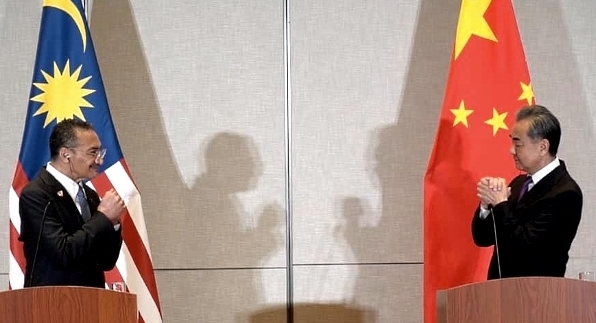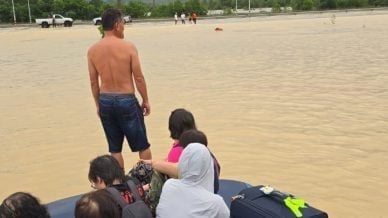By Tay Tian Yan, Sin Chew Daily
In a joint press conference with his Chinese counterpart, foreign minister Hishammuddin Hussein called Wang Yi as his "elder brother". As a result, he was like poking a bee nest and his criticizers began to sting at him mercilessly.
None was more aggressive than Anwar Ibrahim, who said the act was an insult to Malaysia's sovereignty, "as it seemingly implies Malaysia is a puppet to a foreign power."
Former foreign minister Anifah Aman and DAP leaders also lashed out at Hisham for the undiplomatic self-humiliating remark.
Hisham later explained that the "elder brother" was not China, but the Chinese foreign minister Wang Yi standing beside him, arguing that he addressed Wang as "elder brother" to show respect for someone older and more experienced than him.
Was our foreign minister being self-disparaging and undiplomatic?
To me, it is the target of the "elder brother" salutation that matters.
If the "elder brother" from his mouth was the People's Republic of China, then obviously what he did was very inappropriate because all countries are equal in diplomatic protocol, and no country is more superior than another, and there is no "big brother" and "little brother" distinction.
But if Hisham called his Chinese counterpart Wang Yi his "elder brother", then that should be more of a man-to-man relationship and not one between two sovereign states.
As Wang is almost ten years older than Hisham, and far more experienced than him in diplomatic experiences, calling Wang Yi "elder brother" should not be an issue at all, to be honest.
Some may argue that Hisham initially meant to address China as the "elder brother", but changed to Wang only after the incident became an issue.
I watched the video of the press conference over and again. When Hisham was saying in Chinese "my elder brother", he was indeed saying it to Wang Yi while looking at him. No doubt, the "elder brother" was Wang Yi and not China. And when he said "my", he was actually referring to himself, not representing the whole of Malaysia.
Some may still claim that even calling Wang "elder brother" is not appropriate, as they are both foreign ministers holding corresponding job designations and representing two separate nations. No one should be deemed more superior to the other.
Of course, doing so will not raise a dispute at all, but we may also want to take into account the thinking of the Chinese people in diplomacy as well as the unique relationship between Malaysia and China.

Chinese diplomacy is characterized by a stark distinction from the Western way of handling diplomatic matters.
Western diplomats invariably put their countries' interests first in the handling of international relations. Diplomacy is a kind of science, or mathematics that can be computed. Nothing comes more important than own country's interest.
As for the Chinese, their culture places a great deal of emphasis on "courtesy" and "benevolence" as well as a stronger human bond in man-to-man relationship, even country-to-country relationship.
Hisham's "elder brother" address might be construed as self-deprecation in Western diplomacy, but in oriental diplomacy, it could be an exchange of emotions that would elevate man-to-man relationship while bringing two nations closer together.
Among Malaysia's politicians, Hishammuddin is one that understands China's unique conditions relatively well. He shares a largely identical family background as former PM Najib Razak, both maintaining close relations with Beijing. Actually Hishammuddin has already forged a close-knit relation with China while serving as defense minister in the former BN administration.
While the "elder brother" remark may sound awkward to many, from Hishammuddin's perspectives, the salutation carries a completely different meaning and functionality.
And our relationship with China should not be gauged with the same yardstick used for most other countries. From the voyage to the South Seas by Admiral Cheng Ho, to the establishment of diplomatic relationship during Tun Razak's time and the more recent "One Belt, One Road" initiative of Beijing and post-pandemic development of both countries, it is obvious that our relationship with China has been built upon a very special historical and sentimental foundation.
No matter how hard Hisham has tried to explain, he will never be able to stop the onslaught from opposition leaders.
Anwar stepped up his blast at Hisham, arguing that the latter could have set Malaysia's foreign policy back by 25 years, undermining decades of hard work of seasoned Wisma Putra officers.
It is quite clear that this is not just a problem between our two countries, but political struggle within our own shores.
ADVERTISEMENT
ADVERTISEMENT


































